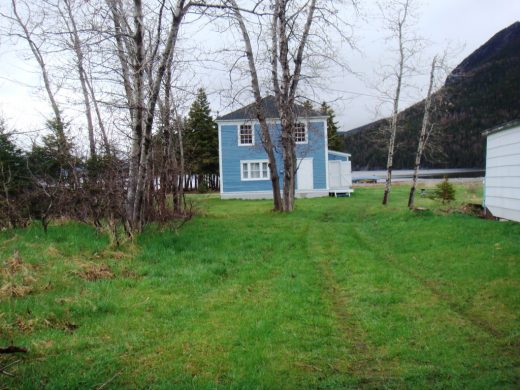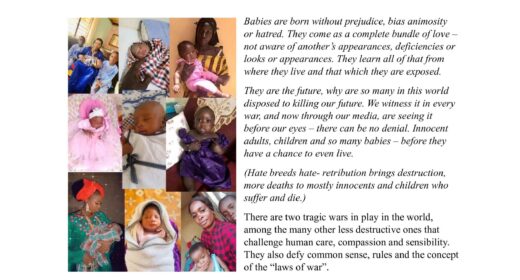
(The picture is the house referred to in this article. I purchased it in 1979 as a summer house. I started a new house in 2010 – this one will be relocated by someone else and utilized as a B&B)
Much of my time over the past few months has been spent living in my old house in Glenburnie. A young French traveler, who recently happened by, suggested in her blog that it was “a house lost in time”, perhaps an apt title for a house over eighty years old and not restored. It could also describe my own state of being these past few months.
Over the past thirty years, many visitors have visited and stayed at my place. Most have commented on its welcoming nature and the presence of a warm and kind spirit. This may be reflective of a different time in Newfoundlandand in the world where such values were considered important.
I have contemplated much these values, their importance and that of my Newfoundland upbringing in my development work and life of travel. This has not been a nostalgic view of the world, as some have suggested, nor, a desire to return people to a world of untold hardship and often despair.
It has been, for me, a reflection of the modern approach to life and living that has pushed people to abandon the old ways and adopt new, without regard for what had value and what was important. The “new” apparently is a pursuit, by most, for bigger and more; no matter the sacrifice to body and soul.
My quest for understanding has caused me to wonder and to wander: most recently, to Eastern Europe andUkraine. This country provided an uncanny familiarity; mostly because of a way of life that resembled my own growing up inNewfoundland. It is a place, as well, where old values are rapidly being displaced in the quest by many for the baubles and supposed riches of western society. This is similar to what has happened in this province and so many other places.
It appears in our modern world that we have veered so far from the original path of human development, that the beginning we understood, is but a vague memory: relegated to just “a big bang”.
The quest for more and bigger has eclipsed the values evident in life and a time, when smaller and rural were considered important. In fact, smaller is considered so unimportant that it needs to be ignored and rural has to be displaced. InNewfoundland, unlike the earlier attempt at resettlement, which was accomplished with mostly sheer brute force, a new approach is being accomplished by stealth and with money. Rural will soon be removed from the vocabulary in countries likeCanada.
Centralization appears to be in vogue in all aspects of our lives, with services being consolidated and infrastructure being removed. This is being done under the guise of cost effectiveness and decentralization; yet examples from elsewhere demonstrate otherwise. The result is inflated management regimes which are expensive to maintain and unsustainable. This concept applies to both business and government and is being done to satisfy apparent blind ambitions and immense egos. Ethics and fairness are now illusions and values and culture a thing of the past.
The Holy Grail now relates to money and power, the real pursuit of those in charge, rather than a spiritual quest.
How are the next generations expected to survive, when most of our natural resources have been depleted and a society has been created of extreme indebtedness? The extent of this debt is even incomprehensible to economists and financial specialists.
Dismissed are the beliefs, values and many of the coping skills that older generations used to survive. These have been relegated, like our traditional and rural lifestyles to the far reaches of our memories.
In other times, houses were homes, a source of shelter for family and a place of comfort to encourage and foster the dreams and aspirations of their children: the true resource of the future.
Perhaps the good feelings and warmth that still exists within older houses like mine, relate to the sense of accomplishment of the family that built it and the significance of caring and sharing that was evident in the values of that society. A society, like my house, now considered “lost in time”.
A quote, attributed to a Canadian Aboriginal, suggested that when lost, one should return to where they began. My understanding was that this related to the spiritual, as well as, the physical.
Perhaps it is not too late for ruralNewfoundlandto pay a visit to its past. One clear observation in Bonne Bay this summer, also evident in other rural places of my travels, is the number of transplanted urbanites living there, even if only part time. They are obviously in search of something larger cities apparently can’t provide. They appear to be attracted by the traditions and lifestyles that made rural communities the lifeblood of the province and the country. Maybe their search relates to those beliefs and values that were once important in rural places likeNewfoundland.
This gives one hope that in time, rural communities, with the assistance of a new wave of immigrants, will convince or cajole the policy makers, politicians and even business that there is inherent value in the small and rural: not just as a provider of resources and labour, which are now finite. Perhaps the elites and those who now rule will come to appreciate the importance of beliefs and values, and understand that money and power have limits as well.
Maybe there will be a renewed understanding that development is more than bricks, mortar and fiscal assets. It encompasses people, their talents, traditions and values: the true foundations necessary for the realization of another generation’s dreams and aspirations.


